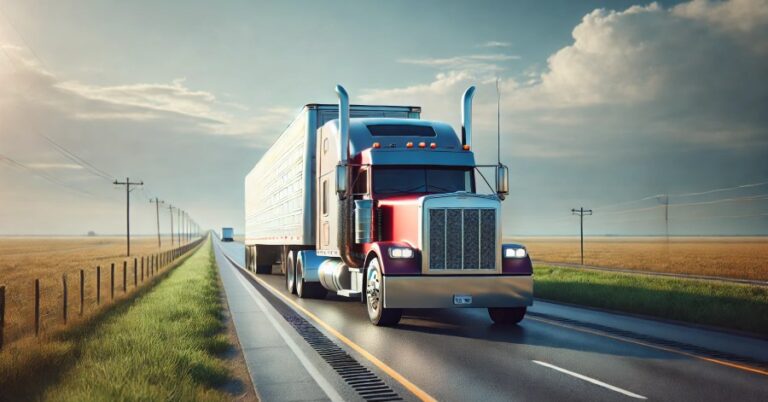How to Start a Trucking Company in Texas (15 Easy Steps)
Texas is one of the best states to start a trucking company, thanks to its booming economy, central location, and high demand for freight transport. With thousands of businesses relying on trucking services daily, there’s plenty of opportunity to build a profitable business.
Starting a trucking company in Texas means gaining control over your schedule, maximizing earnings, and tapping into a growing industry. However, launching a successful operation requires careful planning, legal compliance, and strategic decision-making.
This step-by-step guide will walk you through everything you need—from business registration and permits to finding clients and staying compliant—so you can hit the road with confidence.
What Do You Need to Start a Trucking Company in Texas?
Starting a trucking company in Texas requires more than just a truck and a CDL. To operate legally and successfully, you’ll need to handle business registration, permits, insurance, and equipment. Here’s a quick checklist to get started:
- Register Your Business – Set up an LLC, obtain an EIN, and register with the Texas Department of Motor Vehicles (TXDMV).
- Apply for USDOT and MC Numbers – Required for federal trucking authority.
- Get an Overweight Permit Bond – Necessary if hauling oversized loads.
- Obtain Required Texas Permits – Includes TXDMV Operating Authority, International Registration Plan (IRP), and International Fuel Tax Agreement (IFTA).
- Buy Commercial Trucking Insurance – Texas requires minimum liability coverage, plus optional cargo and equipment protection.
- Open a Business Bank Account – Keeps personal and business finances separate.
- Buy or Lease Equipment – Invest in trucks, trailers, and necessary gear.
- Find Loads and Market Your Business – Use load boards, work with freight brokers, and build a strong online presence.
By setting up these essentials, you’ll be on the right track to launching a successful trucking business in Texas.
Discover More:
Axle Weight Calculator
Texas Oversize Regulations
How to Start a Trucking Company in Texas: Step-by-Step Guide
Starting a trucking business in Texas requires more than just hitting the road—it involves legal compliance, financial planning, and operational setup. By following these 15 steps, you can build a strong foundation for your trucking company and set yourself up for long-term success.
Step 1: Create a Business Plan for Your Trucking Company
A well-structured business plan is essential for securing financing, setting goals, and ensuring profitability. Here’s what to include:
- Choose Your Niche – Decide what type of freight you’ll haul (e.g., dry van, reefer, flatbed, oversized loads).
- Define Service Area – Will you operate intrastate (within Texas) or interstate (across state lines)?
- Estimate Startup Costs – Factor in truck purchases or leases, permits, insurance, fuel, and maintenance.
- Project Revenue & Expenses – Set competitive rates and estimate your monthly costs to determine profitability.
- Research Competition – Study other Texas trucking companies to identify market opportunities.
Step 2: Register Your Trucking Business in Texas
To operate legally, you must register your business with the state and federal government:
- Choose a Business Structure – An LLC is recommended for liability protection, but you can also register as a Sole Proprietorship or Corporation.
- Register with the Texas Secretary of State – Required for LLCs and corporations.
- Apply for an EIN – Get a Federal Employer Identification Number (EIN) from the IRS to open a business bank account and file taxes.
- Get a Texas Sales Tax Permit – Required if your trucking company will sell taxable services.
Step 3: Obtain a USDOT and MC Number
- USDOT Number – Mandatory for all commercial carriers to monitor safety compliance.
- MC Number – Required if you plan to haul regulated commodities across state lines.
- FMCSA Application – Apply through the Federal Motor Carrier Safety Administration (FMCSA).
- BOC-3 Filing – Designate a process agent to handle legal documents for your trucking business.
Step 4: Secure Texas Trucking Licenses and Permits
Trucking companies must obtain multiple permits to stay compliant:
- TXDMV Operating Authority – Required for intrastate trucking operations.
- International Registration Plan (IRP) – Allows multi-state vehicle registration for interstate carriers.
- International Fuel Tax Agreement (IFTA) – Simplifies fuel tax reporting across different states.
- Heavy Vehicle Use Tax (HVUT) – IRS tax for trucks over 55,000 lbs.
- Unified Carrier Registration (UCR) – Federal registration for interstate trucking businesses.
- Texas DMV Commercial Vehicle Registration – All commercial trucks must be properly registered.
Step 5: Get an Overweight Permit Bond
If you plan to haul oversized loads, Texas law requires you to obtain an Overweight Permit Bond.
- Why It’s Required – Protects the state from unpaid fines and road damage caused by heavy trucks.
- What It Covers – Guarantees compliance with overweight permit rules.
- Who Needs It – Trucking companies hauling oversized or overweight freight.
- Where to Get It – Purchase from a bonding company or insurance provider.
Do You Need a Texas Overweight Bond? Get One Here!
Step 6: Purchase Commercial Truck Insurance
Texas law requires all trucking businesses to carry insurance:
- Minimum Liability Coverage – At least $750,000 in liability insurance is required.
- Additional Coverage Options – Consider cargo insurance, physical damage coverage, and workers’ comp.
- Compare Policies – Get multiple quotes from top commercial trucking insurers in Texas.
Step 7: Open a Business Bank Account and Set Up Finances
- Separate Business & Personal Finances – Helps with bookkeeping and tax reporting.
- Apply for a Business Credit Card – Useful for fuel, truck maintenance, and unexpected expenses.
- Use Accounting Software – Programs like QuickBooks or Truckstop.com help track invoices, expenses, and tax filings.
Step 8: Purchase or Lease Trucks and Equipment
- New vs. Used Trucks – New trucks cost more but come with warranties, while used trucks offer savings but may require more maintenance.
- Best Trucks for Texas Freight – Consider Kenworth, Peterbilt, or Freightliner for long hauls and heavy loads.
- Consider Leasing – Leasing lowers upfront costs but may result in long-term financial commitments.
Step 9: Register for the Texas Workforce Commission (TWC)
If you plan to hire employees, you must register with the Texas Workforce Commission (TWC).
- Why It’s Required – Ensures compliance with unemployment tax laws.
- How to Register – File online through the TWC portal.
- Who Needs It – All trucking companies hiring W-2 employees instead of independent contractors.
Step 10: Enroll in Drug and Alcohol Testing Programs
- DOT Compliance – All CDL drivers must participate in a drug and alcohol testing program.
- Consortium Enrollment – Small carriers can join a third-party consortium to manage testing.
- Keep Records – FMCSA requires proof of compliance for random and mandatory tests.
Step 11: Get an Electronic Logging Device (ELD)
- Federal Requirement – ELDs track driver hours to prevent logbook fraud.
- Best ELD Providers – Consider Samsara, KeepTruckin, or Geotab.
- Integrate with Fleet Management Software – Boost efficiency and compliance.
Step 12: Hire Drivers or Become an Owner-Operator
- CDL License Requirements – Ensure drivers meet Texas CDL standards.
- Driver Qualification Files (DQF) – Keep records of driving history, medical exams, and compliance documentation.
- Payroll & Benefits – Decide between W-2 employees or 1099 contractors.
Step 13: Register for the Texas Franchise Tax
- Why It’s Required – LLCs and corporations must pay this annual tax.
- How to Register – File with the Texas Comptroller of Public Accounts.
- Filing Deadlines – Due May 15th each year to avoid penalties.
Step 14: Find Loads and Build a Customer Base
- Use Load Boards – Platforms like DAT, Truckstop, and 123Loadboard help find freight.
- Work with Freight Brokers – Build relationships to secure consistent loads.
- Direct Contracts with Shippers – Cut out middlemen to increase profitability.
- Set Up a Website & Social Media – Boost online presence and attract new clients.
Step 15: Maintain Compliance and Scale Your Business
- Stay Up-to-Date on Regulations – Renew licenses, permits, and registrations on time.
- Perform Routine Maintenance – Keep trucks in good condition to avoid breakdowns and fines.
- Expand Your Fleet – As your business grows, add more trucks and hire additional drivers.
How Much Does It Cost to Start a Trucking Company in Texas?
Starting a trucking company in Texas requires a significant financial investment. From business registration and permits to equipment and insurance, costs can add up quickly. However, with proper planning, you can budget effectively and avoid unexpected expenses. Below is a breakdown of the typical costs involved:
Estimated Startup Costs for a Texas Trucking Business
Estimated Trucking Business Expenses (Texas)
| Expense Category | Estimated Cost Range (USD) |
|---|---|
| Business Registration (LLC) | $300 – $500 |
| USDOT & MC Number Fees | $300 – $600 |
| IRP & IFTA Fees | $500 – $2,000 |
| Overweight Permit Bond | $100 (varies by weight) |
| Commercial Truck Insurance (Annual) | $8,000 – $15,000 |
| Truck Purchase/Lease | $50,000 – $200,000 |
| Fuel Costs (Monthly) | $3,000 – $8,000 |
| Maintenance & Repairs (Annual) | $5,000 – $15,000 |
Planning for Success
While the costs can seem high, strategic budgeting and smart financial management can make launching your trucking company more affordable. Consider leasing equipment, comparing insurance providers, and using fuel-saving strategies to reduce expenses.
Why Trucking Companies Need an Overweight Permit Bond
Texas trucking companies that haul oversized or overweight loads must meet strict regulations before hitting the road. One key requirement is securing an Overweight Permit Bond, which ensures compliance with state laws and protects public infrastructure. Without this bond, you risk fines, delays, and potential legal issues.
Why Is an Overweight Permit Bond Required?
- Texas Legal Requirement – The Texas Department of Motor Vehicles (TXDMV) requires trucking companies to obtain a bond before issuing an overweight permit.
- Ensures Compliance – Helps trucking businesses meet Texas weight regulations and avoid costly penalties.
- Protects Public Roads – Heavy trucks cause wear and tear on roads and bridges, and this bond helps cover potential damage costs.
- Avoids Fines & Delays – Operating overweight trucks without the required bond can lead to permit denials, legal violations, and expensive fines.
- Part of the Permit Process – A bond is mandatory before securing an overweight permit, ensuring carriers can legally transport heavy loads.
Securing an Overweight Permit Bond is an essential step for trucking companies hauling oversized freight in Texas. Without it, your trucks can’t legally operate, and delays could cost you valuable business.
What Does an Overweight Permit Bond Cover?
An Overweight Permit Bond isn’t just another requirement—it plays a crucial role in keeping Texas roads safe and ensuring trucking companies operate within the law. This bond provides financial protection in case of violations, unpaid fees, or damages caused by overweight loads.
What a $15,000 Overweight Permit Bond Covers
- State Road Damage Costs – Helps cover repairs and maintenance for roads impacted by heavy freight.
- Unpaid Fees and Fines – Ensures that the state receives payment if a trucking company fails to cover overweight-related fees.
- Legal & Regulatory Compliance – Guarantees that carriers follow Texas weight regulations and maintain proper permits.
- Liability for Permit Violations – Protects against financial losses if a trucking company exceeds weight limits or violates permit terms.
- Peace of Mind for the State and Truckers – Provides financial assurance that trucking businesses can legally haul oversized loads without putting infrastructure or public safety at risk.
By securing an Overweight Permit Bond, trucking companies demonstrate their commitment to safety and compliance, helping them avoid costly legal issues and operational delays.
Get Your Texas Overweight Permit Bond Today!
If you haul heavy loads in Texas, an Overweight Permit Bond is required by law. Without it, you won’t be able to obtain a Texas Overweight Permit, which means no hauling, lost income, and potential fines.
Don’t let paperwork slow you down—get your bond today and keep your trucks on the road!
Only $100 – Flat fee. No hidden costs.
Instant Approval – Get bonded today and start hauling.
Required by Texas – No bond? No overweight permit.
Stay Compliant & Keep Moving
Avoid penalties, delays, and lost income. Secure your Texas Overweight Permit Bond now and focus on growing your trucking business.
Share This Post
Related Articles
Every year, Texas truckers and trailer owners face hefty fines due to improper weight distribution on a trailer. Misloading can...
A real estate notary plays a crucial role in property transactions, ensuring that documents like deeds, mortgage agreements, and loan...
A notary bond is a crucial requirement for becoming a notary public in Arizona. It serves as a financial guarantee...
Get Started
The bonding process can be confusing and cumbersome. Our surety bond experts are standing by and ready to answer any questions. Let’s get you bonded today!


